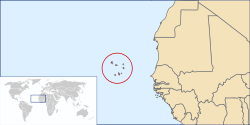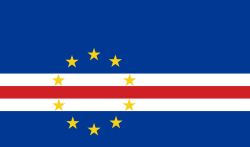

The following outline is provided as an overview of and topical guide to Cape Verde:
Contents
- General reference
- Geography of Cape Verde
- Location
- Environment of Cape Verde
- Regions of Cape Verde
- Demography of Cape Verde
- Government and politics of Cape Verde
- Branches of government
- Foreign relations of Cape Verde
- Law and order in Cape Verde
- Military of Cape Verde
- History of Cape Verde
- Culture of Cape Verde
- Art in Cape Verde
- Sports in Cape Verde
- Economy and infrastructure of Cape Verde
- Education in Cape Verde
- Health in Cape Verde
- See also
- References
- External links
Cape Verde – sovereign country located on an archipelago in the Macaronesia ecoregion of the North Atlantic Ocean, off the western coast of Africa. [1] The previously uninhabited islands were discovered and colonized by the Portuguese in the 15th century (though there may have been earlier discoveries), and attained independence in 1975.







